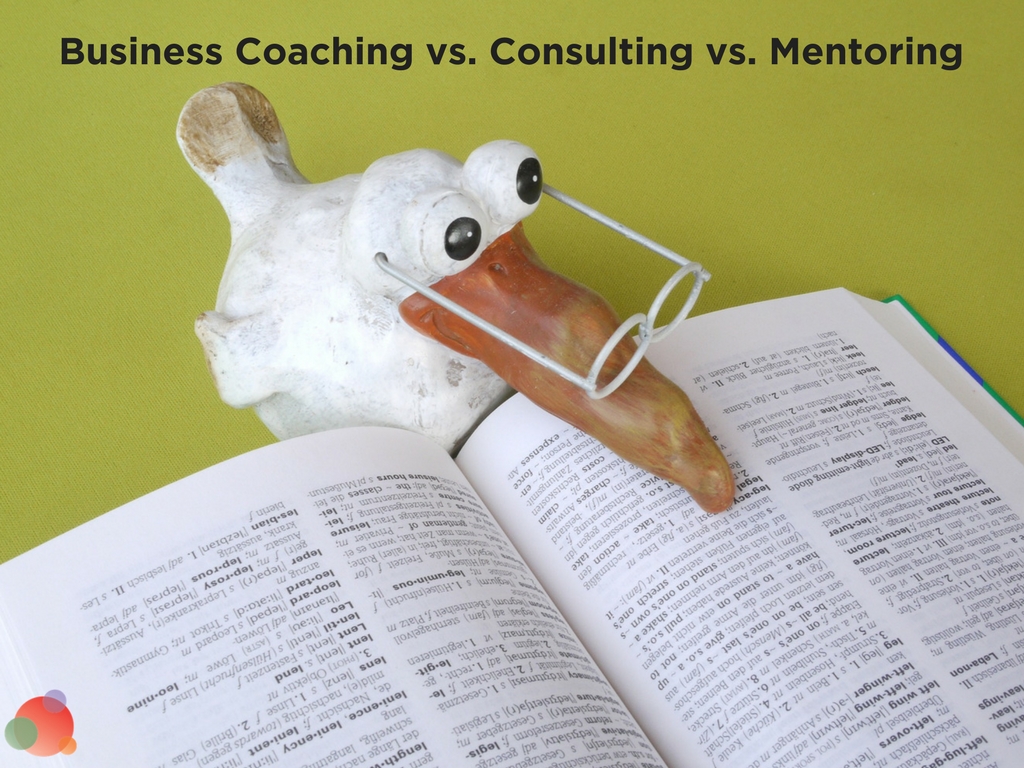
How Business Coaching Differs From Consulting and Mentoring
I was excited a few months back to see that Gini Dietrich, illustrious leader of the Spin Sucks community, wrote about how to “Transition from Being a High-Achiever to a High Performer.” That got me thinking: most people might not really know the differences between some of the valuable offerings mentioned in it, such as business coaching, consulting, and mentoring.
It occurred to me that the members of the Spin Sucks community might gain value from working with a consultant, mentor, or coach.
(Or even all three.)
So in this article, I’ll endeavor to explain these differences, as well as some of the benefits of each.

Let’s Start by Understanding Consulting
Perhaps we should start with a related offering, consulting, because people are somewhat familiar with it, and it’s one of the offerings with which business coaching is often confused.
And that’s partly a result of consultants telling the world they’re coaches.
(Some of them are my friends, whom I otherwise admire tremendously. So no names!)
But consulting is very different from business coaching. And I can say that with full confidence because I’m both a consultant and a coach.
Consulting, in my view, is about helping a business or organization with a specific business issue.
Working with communications agencies, that could include growing the business, better managing the financials, and improving client service and client relationships.
So the practical outcomes of working with a consultant on the above can include:
- Meeting or exceeding agency income goals (not just the actual dollar amount, but the type of clients from which that income emanates, thereby achieving the agency vision);
- Getting the financials on par with or closer to best practices, which can mean greater profitability; and
- Improving client service and client relationships, resulting not only in more satisfied clients, but ones who’ll bring us more projects, and are willing to share raving reviews of our agencies, both in writing and over the phone with our prospects.
A consultant comes in and makes a recommendation. Hopefully, the agency follows it and reaps the benefits.
They can ask the consultant to help implement, or not. And if the consultant does a great job, they’re asked back.
So if your agency or department has a business-related need similar to the examples above, you likely want to hire a consultant.
Two Important Things to Know About Consulting
For a consulting engagement to bring value to an agency, both agency and consultant must do their parts.
That said, it’s primarily a consultant-led endeavor.
The consultant asks the questions, which the agency must answer fully and forthrightly.
The consultant takes in the agency answers, and after careful consideration makes the recommendation.
Then it’s up to the agency to implement, with or without the consultant’s involvement.
Again, primarily a consultant-led endeavor. (Hold that thought).
Here’s another critical distinction about consulting: According to the Institute for Professional Excellence in Coaching (iPEC), where I did my coaching training, consultants come up with answers to questions, and suggest discreet solutions.
(Remember that).
It’s all about sharing the consultant’s knowledge, counsel, advice, and expertise, based on their experience.
It has the potential to be highly valuable. And it’s not business coaching.
Before we actually get to business coaching, let’s first take a look at mentoring.
What is Mentoring?
Mentoring can be a valuable part of professional development.
As both a mentor and a history geek, I find the story of the first mentor pretty interesting. According to Business Mentors:
Mentoring is most often defined as a professional relationship in which an experienced person (the mentor) supports and encourages people to develop specific skills and knowledge that will maximize (sic) their business potential and improve their performance. In short, it is the transfer of knowledge, skills, and experience. The mentor acts as a guide to find the right direction and develop solutions.
Mentoring is similar to consulting, in that the mentor is sharing advice, expertise, guidance, and counsel.
But they do not receive compensation. At least not in money.
There are two types of mentoring. One is via an outside membership organization. I happen to be a mentor for both PRSA-NY and PRSA-NJ.
Between the two, I have three “mentees.” That’s not a real word, but what am I supposed to call them? My Telemachuses? Telemachi?!
(You need to click on the earlier link about the first mentor to understand that reference. #HistoryGeeksUnite!)
Mentoring can also take place within an organization.
It can be amazingly helpful for the mentee to have the counsel of a seasoned professional who knows the ropes in that company.
I think it’s critical that the mentee not report through the ranks to the mentor.
Why?
This gives the mentor something that a supervisor can’t possibly have, and that’s objectivity about the mentee.
With this arrangement, the mentor doesn’t have skin in the game, which in this case, is a good thing. They’re not part of the story.
And of course, a mentee can’t go to their mentor if that mentor is their boss and say, “Hey, I’m having trouble speaking with you about something you’re doing as my boss. Can you mentor me around this?”
Throughout my career, I wasn’t fortunate enough to have a mentor.
So I can only share the benefits of mentoring based on the issues I discuss with my mentees.
These have included how to speak one’s truth to one’s boss and being aware of and avoiding involvement in office politics.
And, how to get performance feedback long before a review so one can make major improvements in advance of it.
I trust I’ve brought them value in sharing my perspective on these and related topics.
Mentoring someone junior to you, either within your company or a membership organization is richly rewarding. And so is being mentored.
Wherever you are on your career path, I strongly encourage you to participate.
So What is Business Coaching, Already?
Because I’m a proud member of the International Coach Federation (ICF), and on the board of ICF-NJ, let’s start with their definition:
Coaching is partnering with clients in a thought-provoking and creative process that inspires them to maximize their personal and professional potential.
Seems worlds apart from consulting and mentoring, no?
When I speak with prospects (and family and friends) about business coaching, here are two of the points I make:
- Despite using the same core word, executive, leadership, and life coaching are very different from sports coaching. Why? In sports coaching, it’s usually “I win, someone else loses.” (Unless you’re hiring a coach to help you improve your personal record or bike further or more often). In non-sports coaching, it’s always about discovering the win/win.
- I ask them to think about a stagecoach. Centuries ago, a stagecoach, would help you get from point A to point B. Quite often point B was about creating a new life, or a new business. It was often about exciting new vistas and endless possibilities. And yes, that’s what business coaching can do.
How Business Coaching Differs from Consulting and Mentoring
One thing that may be jumping out at you: consulting tends to be for an organization, and focuses on a business or organizational issue.
Business coaching, however, is highly personal, whether it’s with an individual, a team, or a group.
Consulting is about creating answers and solutions.
But according to the ICF, business coaching is quite different, because instead of supplying answers and solutions, coaches ask powerful questions so individuals can discover their own answers and “empower people to repeatedly develop solutions of their own.”
And that goes to the very heart of how business coaching is different from consulting, and in my opinion, in many ways more effective.
Questions are powerful. When you tell someone to do something, they may say “Wow, great idea, I’ll do it!”
But will they? Perhaps. But do they have skin in the game?
The idea came from your brain and your mouth.
Coaches use empowering questions so that the ideas and the solutions come from our clients’ brains and mouths.
When that happens, they have buy-in. And they’ve just increased the chance they’ll take action. Exponentially!
Why?
According to a top coach whom I admire tremendously, Mary Jo Asmus:
Asking an insightful question instead helps them to focus on what they want to do. When that insight happens, they can move forward with clarity and commitment.
This isn’t something Mary Jo or I made up. There is indeed science behind the power of asking empowering questions.
Business Coaching is a Client-Led Endeavor
Whereas consulting (and PR counseling, freelancing, and the related ways you make your daily bread) is practitioner-led.
If the results you projected aren’t there, you’ll change strategies, or swap in some new tactics, to achieve the agreed-upon goals.
Business coaching, on the other hand, is entirely a client-led endeavor.
I’ve had clients who are crawling towards achieving their business coaching engagement goals. I remind myself that this is their journey, not mine.
They will “show up” to the degree that they can. If and when they’re ready to put the pedal to the medal, I’ll be there for them!
Happily, the majority of them are blown away by the speed with which they’ve achieved their goals, how much they’ve changed their leadership styles, and improved their lives.
So unlike my days on the PR agency side, they, not I, get the credit for the progress achieved. And no one is ever blamed.
So Do I Need a Consultant, Mentor, or Coach?
The answer is “yes!”
Many of us would benefit from working with a consultant, and a mentor, and a coach. And many of you work with all three concurrently.
So how do you know which you need? Here are some things to consider:
- Is it a business issue? Perhaps it’s about the agency, but not you personally? Maybe it’s a short-term need? If so, it may be worth reaching out to a consultant.
- Is it about getting an external perspective on your career and building your career path, and how to manage difficult workplace issues, such as managing up to a difficult boss? If so, explore the various mentoring options available in and outside of your company.
- Is it about you, personally, or someone else in your organization? Are you not achieving your leadership, career, organizational, and personal goals? Do you have issues that don’t seem to be getting better, despite how hard you’re trying? Is your leadership style driving people out of your organization? Is there someone in your organization who can go from good to consistently great?
Admittedly, business coaching requires more of the client’s time than being mentored or hiring a consultant.
But the issues that bring one to a coach are generally deep and big.
And I can assure you that the positive, sustainable outcomes that business coaching can drive make it worth the time investment.
Business coaching clients who are “all in” get ROI and much more.
That’s just some of the differences between business coaching, mentoring, and consulting, and why in so many situations coaching can be more powerful.
And to be clear, none of this is to knock consulting or mentoring. As mentioned, I’m both.
(Of course, when I consult or mentor, I use many coaching techniques such as asking empowering questions, because I know this will encourage my clients to take action.)
There’s so much more I could share, for example why you should search for a certified coach, questions you should ask to determine if a coach is right for you, or if you’re ready for a business coaching engagement.
Methinks I’ll have to write a follow-up article!
This post first appeared on SpinSucks on April 18, 2018

